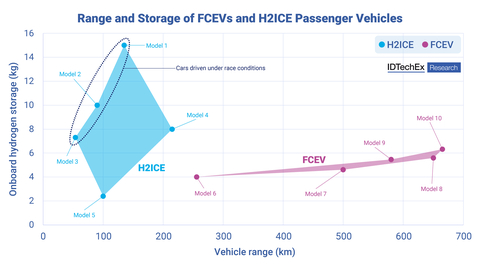
Volume and Not Weight Rule out Hydrogen Combustion for Passenger Cars, Reveals IDTechEx Research
Published by Todd Bush on September 4, 2024
Hydrogen internal combustion engines (H2ICE) promise (almost) zero emissions transport without relying on expensive, slow-to-recharge batteries. As hydrogen is a carbon-neutral fuel, H2ICE offers an opportunity to retain the combustion engine in an increasingly zero-emissions world. OEMs and suppliers can apply minor modifications to existing engine and vehicle production lines and produce carbon-neutral vehicles that retain many characteristics of existing ICEs.

IDTechEx has analyzed the performance and storage of various H2ICE and FCEV models. The results indicate that H2ICE consumes more fuel (kg H2/100km).
>> In Other News: BP Energy Partners Announces the Sale of MIRATECH, a Market Leader in Emissions Reduction Technology & Compliance Solutions
So, does the hydrogen combustion engine offer a viable route to continuing ICE vehicle production? According to IDTechEx’s new “Hydrogen Internal Combustion Engines 2025-2045: Applications, Technologies, Market Status and Forecasts” report, the answer is, at least for cars, no. But why?
Hydrogen is the most abundant element in the universe and is also the lightest. When combusted in the presence of oxygen, hydrogen releases a huge amount of energy—around 39.3kWh per kg. In comparison, a kilogram of diesel contains 12.6kWh. This might suggest that hydrogen is a wonder fuel, able to store huge quantities of energy and enable hydrogen-powered vehicles to travel enormous distances without needing large storage tanks. This is only half true, and weight is only part of the problem. The big issue is volume.
While hydrogen has a high gravimetric energy density, it has a very low volumetric energy density, about 3,000 times less than diesel at atmospheric pressure. To get useful amounts of energy, hydrogen must be stored as a compressed gas, typically at 350- or 700-times atmospheric pressure. Even in its most dense form (liquid), hydrogen contains just 26% of the energy per volume as diesel.
The drivable range also factors in the energy efficiency of a vehicle. This is where H2ICE falters compared with its hydrogen counterpart, the fuel cell electric vehicle (FCEV), which travel further on the same amount of hydrogen than an H2ICE vehicle.
IDTechEx has analyzed the real-world performance of various H2ICE and FCEV vehicles to assess fuel consumption, and the results clearly show that FCEVs are more fuel-efficient. For a passenger car to run on hydrogen combustion and achieve a range comparable to a petrol/diesel ICE, it would need an enormous storage vessel – a tank 3.5x larger would be required to contain the same energy content.
IDTechEx’s report explores some of the sectors where these challenges are less pronounced, and the case for H2ICE is much stronger. For passenger cars, however, the future seems set to be electric.
To find out more about the new IDTechEx report, please visit www.IDTechEx.com/H2ICE. Downloadable sample pages are available.
For the full portfolio of hydrogen market research available from IDTechEx, please see www.IDTechEx.com/Research/Hydrogen.
About IDTechEx
IDTechEx provides trusted independent research on emerging technologies and their markets. For more information, contact [email protected] or visit www.IDTechEx.com.
Subscribe to the newsletter
Daily decarbonization data and news delivered to your inbox
Follow the money flow of climate, technology, and energy investments to uncover new opportunities and jobs.
Latest issues
-
City of Lancaster and City of Industry Launch First Public Hydrogen
Inside This Issue 💧 Revolutionizing the Green Hydrogen Market: City of Lancaster and City of Industry Launch First Public Hydrogen (FPH2)--the First Public Hydrogen Utility 🌿 Drax and Pathway Ener...
-
Pathway Energy Launches Ultra-Negative SAF, Gulf Coast Facility Plans
Inside This Issue 🌍 Carbon-Negative Fuels Pioneer Pathway Energy Debuts with Ultra Negative Sustainable Aviation Fuel and Plans for New SAF Facility on US Gulf Coast 🛠️ NETL Supported Completion o...
-
Technip Energies & GE Vernova Win Major Contract for Net Zero Teesside Power with Carbon Capture
Inside This Issue 🏭 Technip Energies and GE Vernova Awarded a Major Contract for the Net Zero Teesside Power Project, Which Aims to Be the World’s First Gas-fired Power Station With Carbon Capture...
Company Announcements
-
Electra and Interfer Sign MOU to Collaborate on Clean Iron and Green Steel Production
BOULDER, Colo., Dec. 17, 2024 (GLOBE NEWSWIRE) -- Electra, a clean iron company, and Interfer Edelstahl Group, a global steel and raw materials trader, have signed a memorandum of understanding (MO...
-
Copenhagen Infrastructure Partners Acquires Majority Stake in ABO Energy’s Wind and Hydrogen Project
ST. JOHN’S, Newfoundland and Labrador and COPENHAGEN, Denmark, Dec. 17, 2024 (GLOBE NEWSWIRE) -- Copenhagen Infrastructure Partners (CIP), through its Energy Transition Fund (CI ETF I), has acquire...
-
BOLINGBROOK, Ill., Dec. 17, 2024 /PRNewswire/ -- Hyzon (NASDAQ: HYZN) (Hyzon or the Company), a U.S.-based, high-performance, hydrogen fuel cell system manufacturer and technology developer focused...
-
Thyssenkrupp Nucera Prepared for Any US Shift on Green Hydrogen
FRANKFURT, Dec 17 (Reuters) - Thyssenkrupp Nucera, which makes electrolysers needed to produce low-carbon hydrogen, could quickly shift resources elsewhere if U.S. policies under President-elect Do...